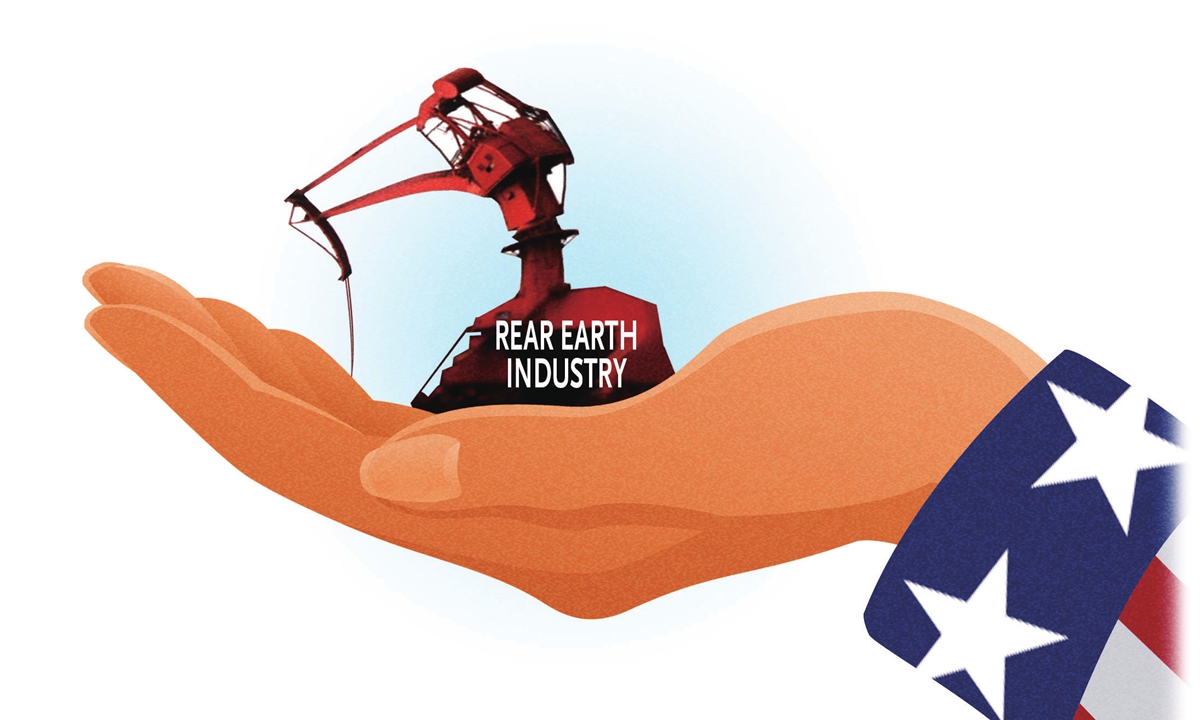
Illustration:Liu Rui/GT
In a fresh move framed by Joe Biden as "not anti-China" but "pro-America," the US leader on Tuesday touted domestic efforts to cut into China's electric battery dominance that center around mining and processing key minerals including lithium and rare earth metals.
In delivering the mostly boastful rhetoric, the Biden administration has sunk deeper into the mire of pitting the US against China that is in direct opposition to its own interests, a time-tested lesson Washington seems to have never learned.
As China is leading globally in mining and processing rare earths, which is critical to almost everything from consumer electronics, electric vehicles, wind turbines to weaponry, what the US wants to do is to wean off its dependence on China.
China's rare earths production rose to 168,000 tons in 2021 from the prior year's 140,000 tons, while the US output edged up from 39,000 tons to merely 43,000 tons, according to the annual mineral commodity summaries published by the US Geological Survey in January.
That suggests China produced 60 percent of the world's total of 280,000 tons, while the US accounted for only 15.4 percent.
Additionally, China's rare earths reserves total 44 million tons, or about 36.67 percent of global reserves. By comparison, US reserves stood at mere 1.8 million tons, making up 1.5 percent of the world total, according to the same data.
It means despite all its moves to ramp up domestic rare earths production, the US has to clumsily grapple with its rare earths shortfall. No accounts could be more convincing than Biden's own narrative of the dearth of critical materials.
In his remarks at the Tuesday virtual event on securing critical minerals, Biden said that US demand for lithium, graphite, and rare earth materials is expected to increase by 400 to 600 percent in the next several decades.
Biden said resignedly, however, "up to now, we've had to import a significant portion of them - close to 100 percent importation - from other countries, particularly China, Australia, and Chile."
China was the US' top import source for rare earth metals, representing 78 percent of its total imports during 2017-20, while Estonia took the second spot with 6 percent, Malaysia third placed with 5 percent and Japan fourth ranked with 4 percent, per the latest numbers from the US Geological Survey. All these numbers apparently speak volumes about China's dominance across global rare earth supply chains.
For one thing, Biden's push to ramp up US rare earths capacity is countering a domestic dilemma that has seen local residents unnerved by the mining of rare earths due to environmental woes. Rare earths production requires sophisticated techniques to ensure the minerals' mining and processing progress in a way that is best aligned with a global call to be environment friendly.
That China has already topped global rare earths production actually puts the country in an advantageous position, as throughout the years China has delicately balanced its rare metals output with the economy's transition toward greener and more sustainable growth mode.
Playing a catch-up in rare-earth production would almost be a mission impossible for the US, let alone the even more difficult part of the gap: rare earths refining.
China is known for its staggering lead in rare earths extraction and separation, consolidating its global dominance in refining the critical mineral to an extent leading the rest of the world.
By October 2018, China had filed for 25,911 rare earth patents, compared with 9,810 from the US, 13,920 from Japan and 7,280 from the EU, according to the South China Morning Post, citing statistics from Kennedy's research supplier PatentManiac.
China's low-cost yet efficient production of rare earths renders the country's supremacy in the all-important minerals, which is not something to be matched by Biden's lip service, because talk is cheap.
The author is a reporter with the Global Times. bizopinion@globaltimes.com.cn




